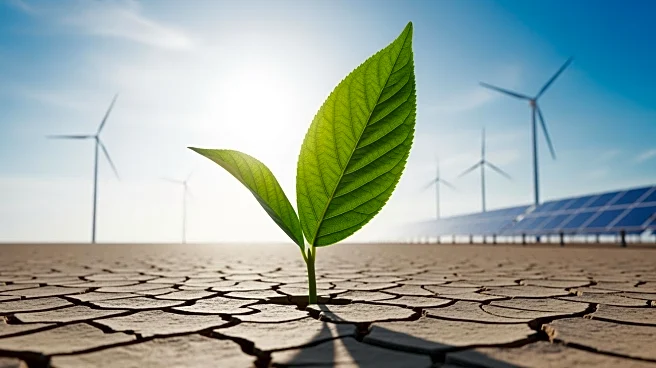What's Happening?
The COP30 climate summit in Belém, Brazil, is proceeding without the participation of President Trump or a senior-level U.S. delegation. Indigenous protesters have clashed with security personnel, denouncing
the impact of agribusinesses and illegal mining on the Amazon. The summit highlights the ongoing struggle to meet the Paris climate accord's target of limiting global warming to 1.5 degrees above preindustrial levels. Despite efforts to transition to renewable energy, global carbon emissions are projected to reach an all-time high. President Trump has criticized climate action, labeling it a 'con job' and advocating for traditional energy sources. His administration has withdrawn from the Paris accords and stalled international efforts to curb plastic pollution and greenhouse gas emissions.
Why It's Important?
The absence of U.S. leadership at COP30 underscores a shift in global climate dynamics, with other nations advancing climate initiatives independently. This could lead to increased collaboration among countries willing to tackle climate change, potentially sidelining the U.S. in international environmental policy. The lack of U.S. participation may impact global efforts to reduce emissions and transition to clean energy, as the U.S. is a significant emitter. Countries like China are capitalizing on clean energy opportunities, potentially gaining economic advantages. The situation highlights the growing divide between U.S. policies and global climate action, with implications for international relations and environmental progress.
What's Next?
Countries at COP30 may form 'coalitions of the willing' to advance specific climate action plans, bypassing the need for unanimous U.N. consensus. This approach could accelerate climate initiatives but may also lead to fragmented efforts. The U.S. may face increased pressure from domestic and international stakeholders to re-engage in climate discussions. As global investment in clean energy surpasses fossil fuels, the U.S. risks falling behind in the green energy sector, affecting its economic competitiveness. The summit's outcomes could influence future climate policies and international collaborations, shaping the trajectory of global environmental efforts.
Beyond the Headlines
The ethical implications of climate action are significant, as vulnerable communities face disproportionate impacts from environmental degradation. The absence of U.S. leadership may prompt other nations to adopt more aggressive climate policies, potentially leading to geopolitical shifts. The summit highlights the cultural and societal challenges of addressing climate change, as indigenous voices demand recognition and protection of their lands. Long-term, the global transition to renewable energy could redefine economic power structures, with countries investing in green technologies gaining influence.









